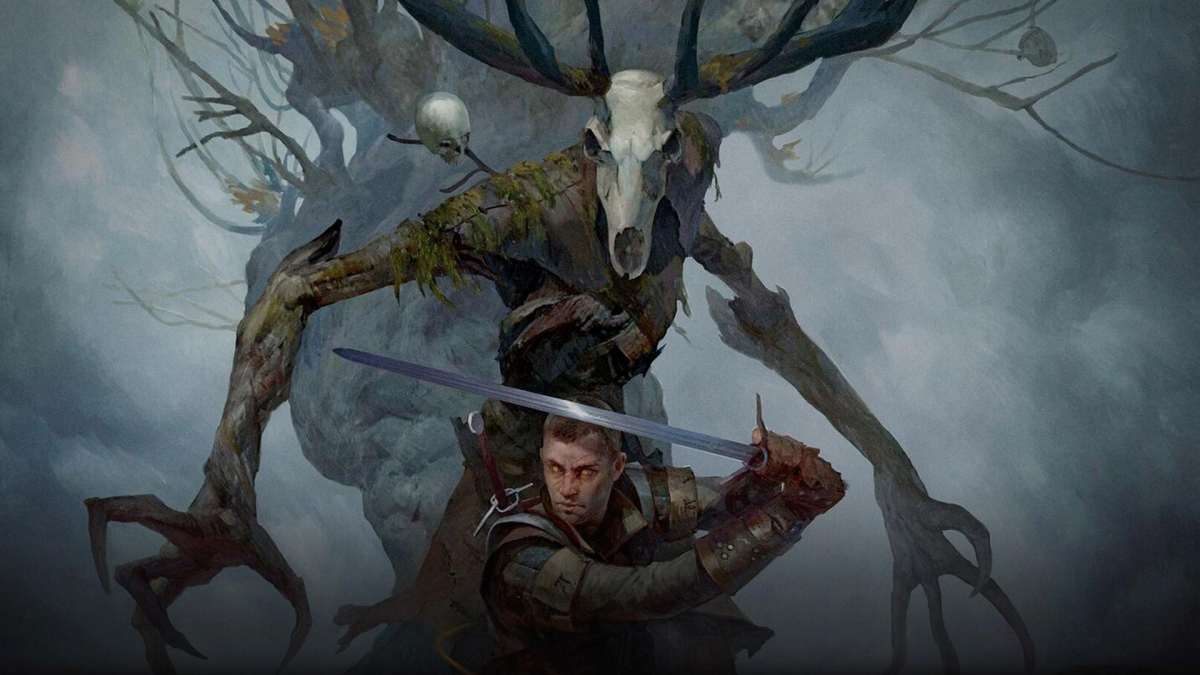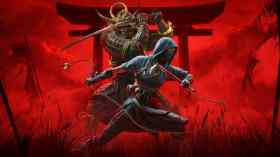In a successful Kickstarter campaign, The Witcher: Old World board game promised ‘an action-packed adventure, full of immersive choices and excitingly fresh mechanics.’ Having now experienced the game with a full complement of five players, as well as in its solo variant form, I’m pleased to find that it does actually succeed quite well in these goals.
Intimidating from the outset, thanks to the enormous amount of card decks, boards, counters, and apparent mechanics it features, the goal for victory in The Witcher: Old World is quite simple. The first Witcher to claim four trophies wins. These can be obtained from slaying monsters, obviously, but also from duelling other players and fully levelling your character’s individual skills.
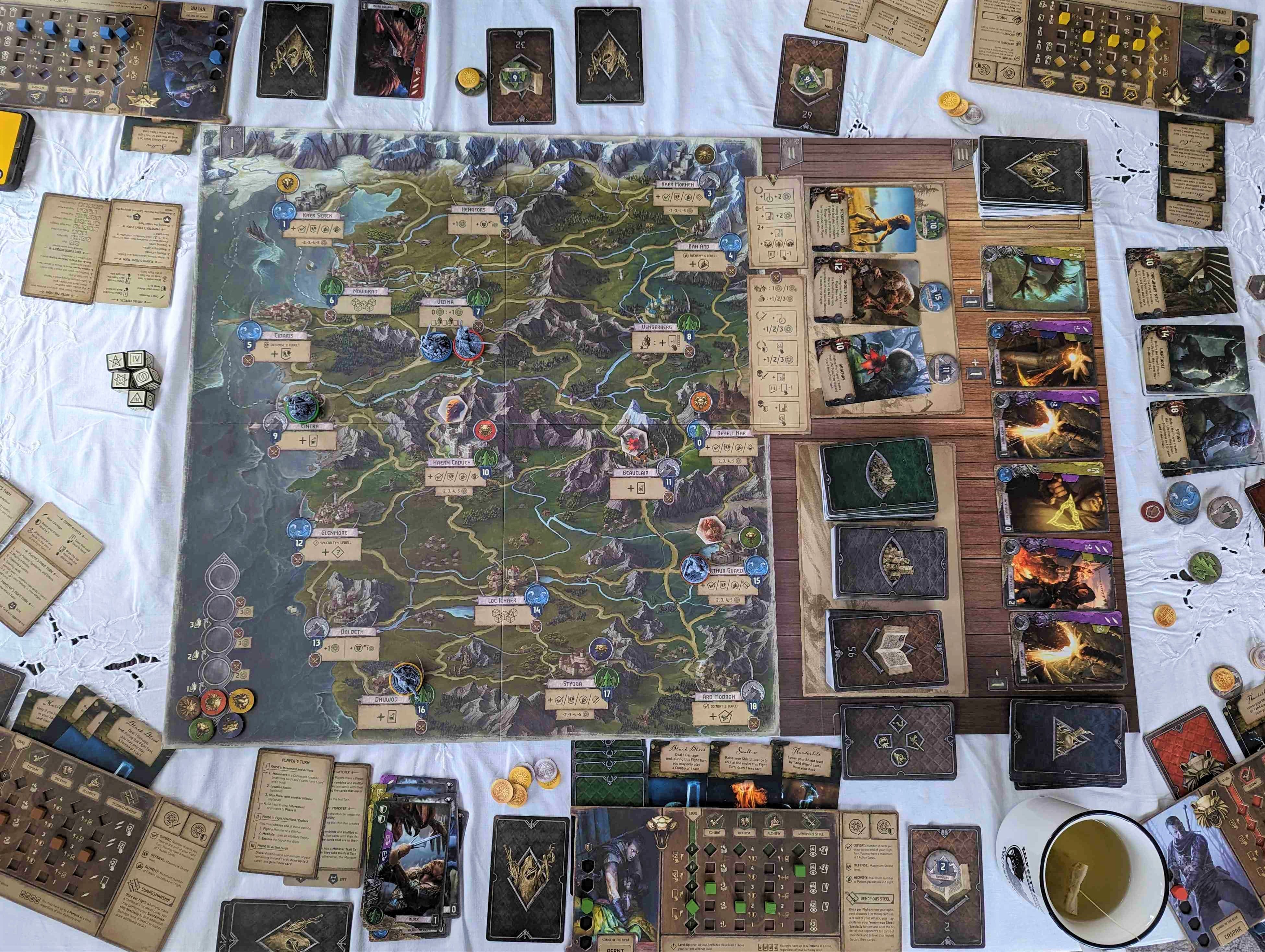
My initial weekend with it was spent learning the solo variant mode by myself one day, and then being responsible for teaching it to four other players the next. The whole endeavour felt daunting at first, but OId World proved to be very much one of those games that just clicks after a couple of turns.
The Witcher: Old World – Gameplay
Each player in Old World controls a Witcher from one of five different schools. They begin with a specific starter deck of ten cards, a small number of gold coin counters, an RPG-esque character board with all stats set at one, and a miniature placed on their home school on the map board. Each player’s turn is divided into three phases.
In phase one they must move to an adjacent town at least once, discarding a card from their hand which features a matching location type icon to do so. They are free to make a single use of the town’s special activity per turn while there – such as paying gold to increase a character stat, ‘poker dice’ gambling, gaining a combat potion etc. – and can continue travelling around the map, so long as they have cards in hand to discard on doing so.
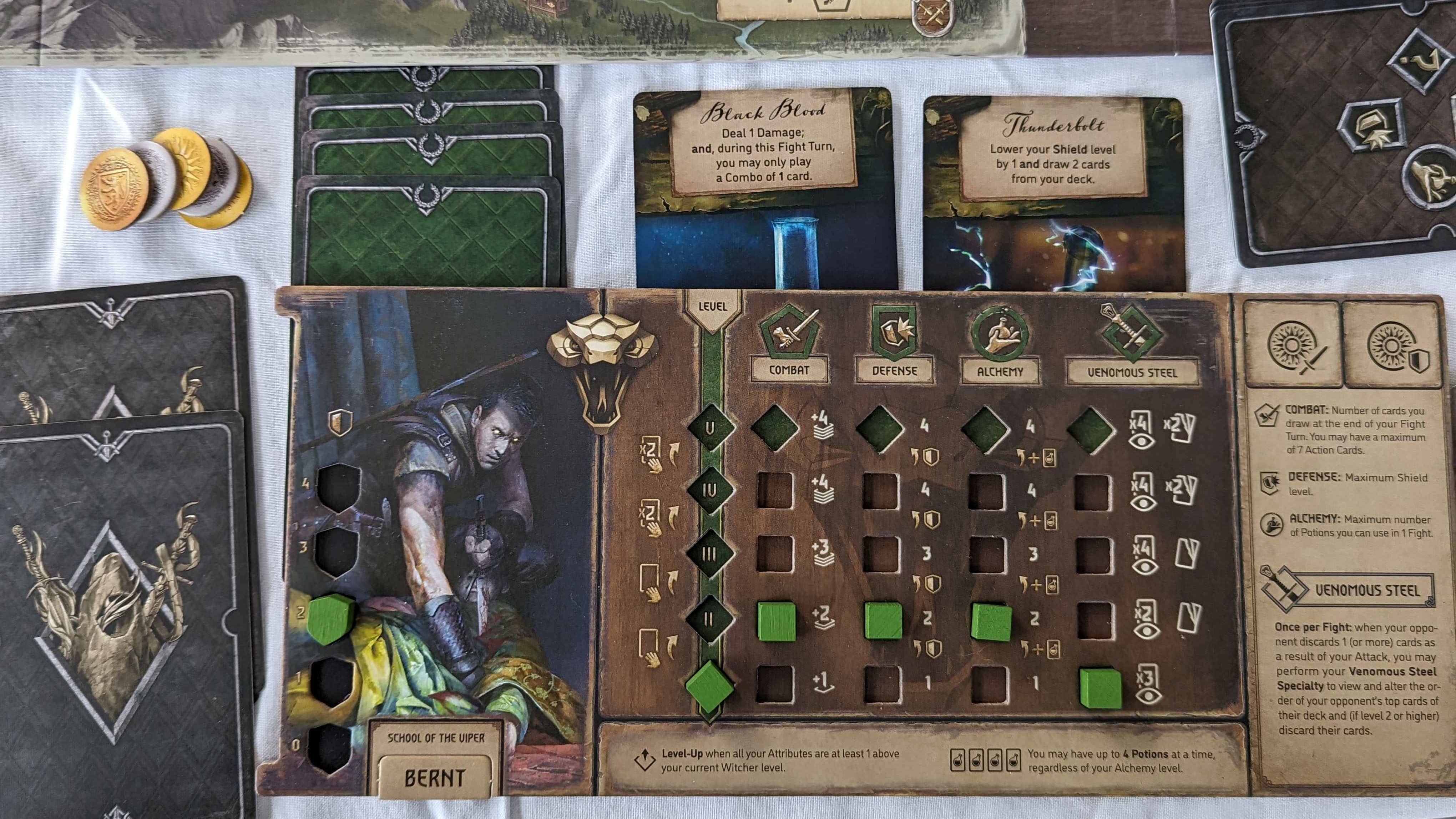
In phase two, the player must choose from one of several options. They can explore either the city or the woods, wherein the player to their right draws a card from the appropriate deck and reads them a scenario that presents two possible options. These can give instant negative or positive outcomes for the player, and can also result in a specifically numbered quest card to be drawn face down, that’s tied to a specific city. When the player enters that city, the quest card is immediately flipped and resolved, leading to more outcomes, which can be good or bad.
A player in phase two can choose to fight a monster if they happen to be in the same city as one, challenge another Witcher to a duel or a round of poker dice if they happen to also share the same location, or if they already have a skill at rank five, they can meditate to earn a trophy on it, should that particular skill’s one trophy card still be available in the shared pool.
Phase three is where the deckbuilding happens, as the player draws up to three cards from their hand, and must purchase one new card from the rolling spread that lies adjacent to the board.
The Witcher: Old World – Combat
In Old World, Combat against monsters and rival Witchers is incredibly brutal. Each card in a Witcher’s arsenal features colour-coded nodules and slots that must be smartly comboed together each round in order to deal damage, recover shields, and manage your deck.
Your deck itself doubles as your life pool, with each hit you take permanently reducing it. There’s a compelling balance to be struck between taking opportunities to permanently trash your less-good starting cards so that you can be more vicious, while also remaining conscious not to dump too many, so that you can absorb some punishment in return.
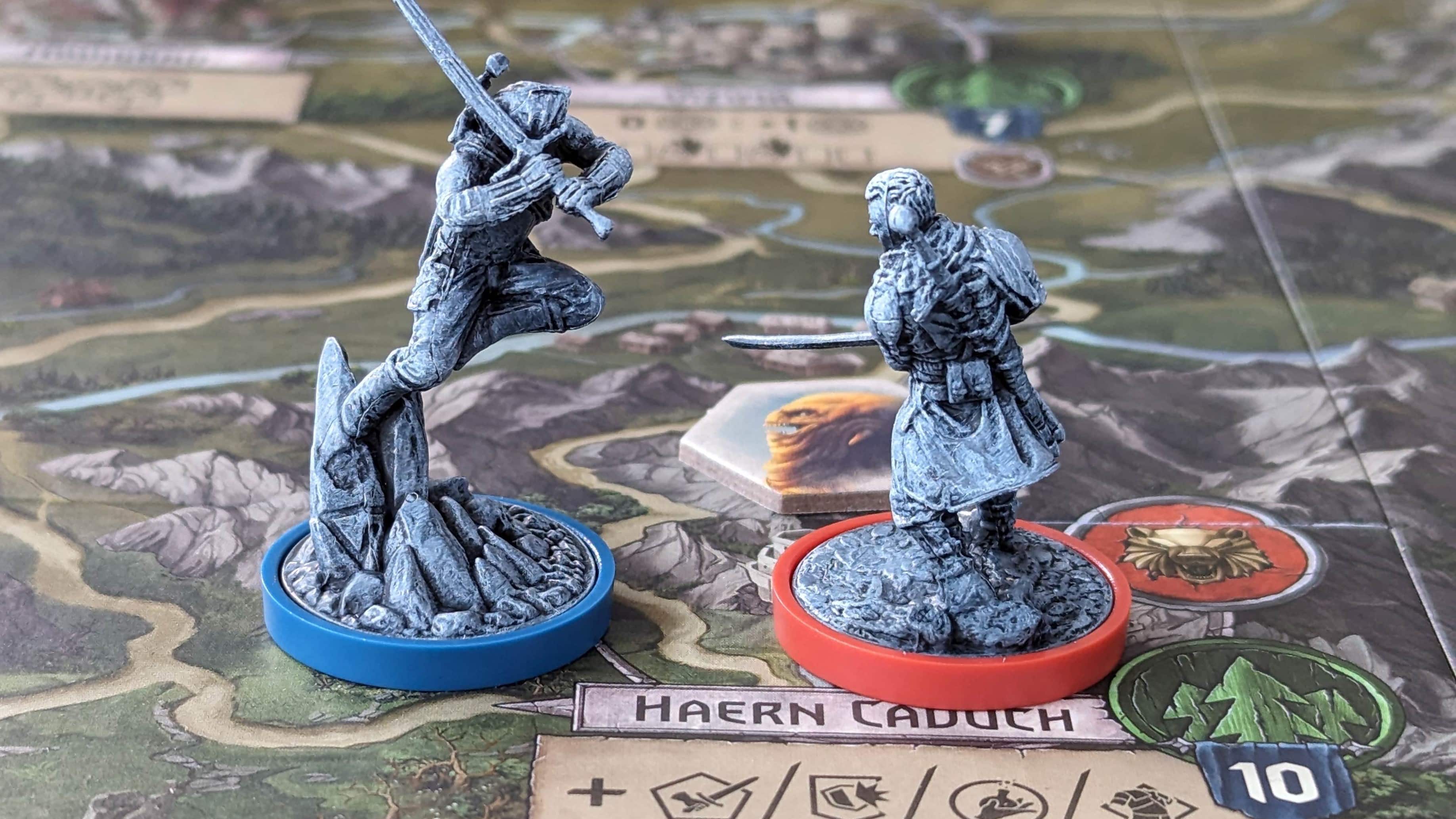
Each monster fights with a deck of creature combat cards, which is randomly drawn to a size matching the information on its associated information card, laid out on the side of the board at the beginning of the game. Each creature combat card presents two options, which are chosen by the other players before the card is drawn and flipped. Meanwhile, player-controlled rival Witchers fight back with their regular deck.
A Witcher cannot die, and players cannot be eliminated from the game at all, so there’s no real risk in having a crack at a duel if you think you can handle it. It’s a system that encourages fights to be resolved in a speedily violent manner, but with considered preparation – which aptly, feels very much like The Witcher.
The Witcher: Old World is a lot – but it works
The fact that a game with this many moving parts congeals together into something that’s eminently playable continues to surprise me. And it feels like if any of the game’s myriad of systems were removed or simplified, a lot of the flavour of the Witcher property itself would be lost.
Old World does an impressive job of putting its players into the shoes of an amoral travelling monster hunter – although some exploration and quest cards can lean a little too hard on the ‘edgy’ side in ways that are at times cringe, and at others, outright problematic.
There’s amusement to be had reading grimdark scenarios to each other, and judging your friends on the choices they make – but the consensus in my group is that we all wished that the various narrative decks had a little more tonal variety to them.
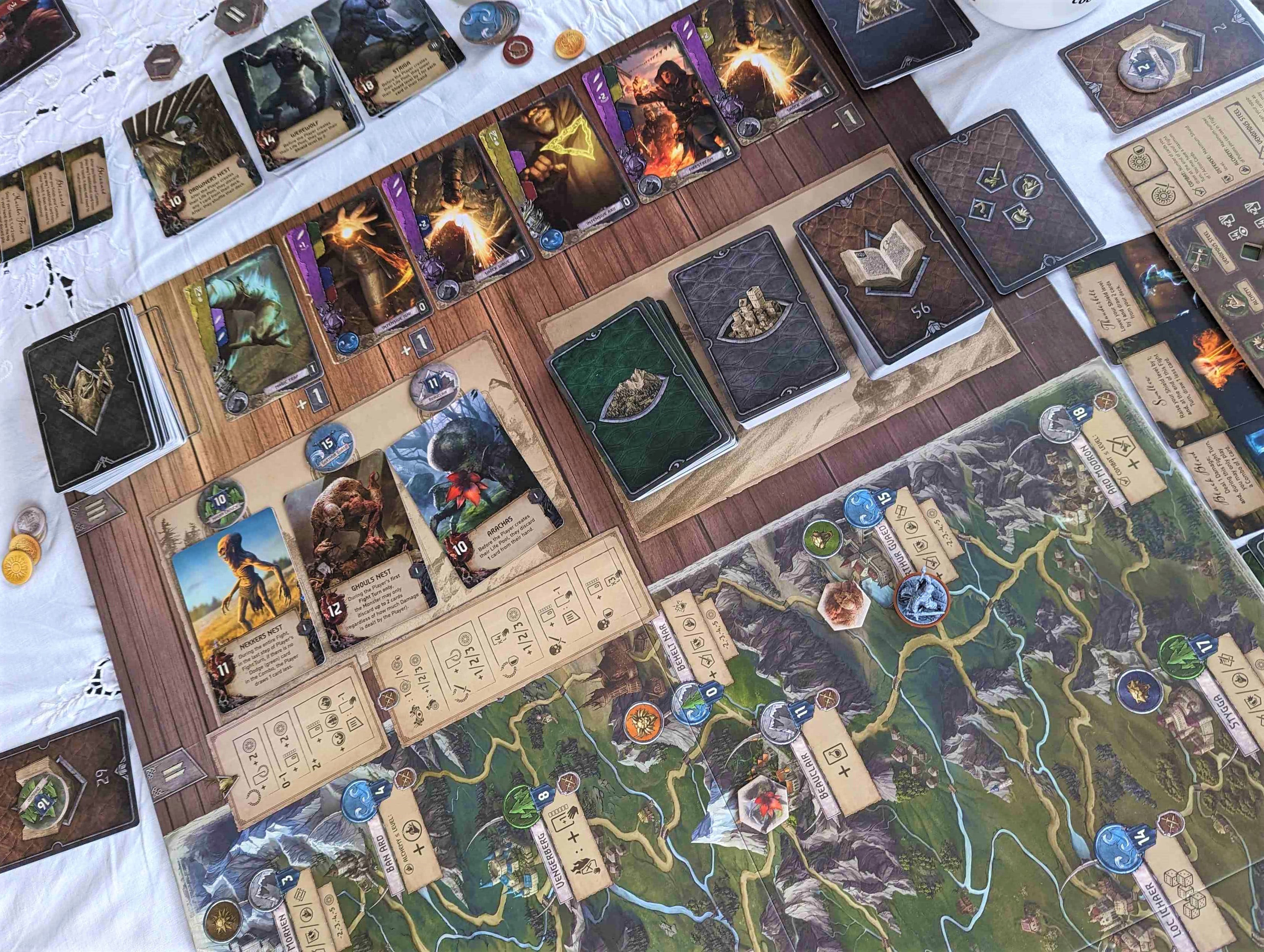
The biggest issue in The Witcher: Old World by far is one which frankly most tabletop first editions face: its rulebook kind of sucks. It’s not the most egregious case I’ve seen by a long shot, but there were more than a few times where I had to go to Board Game Geek’s forums for rule clarifications, and others where it took multiple seasoned board gamers at the table each reading over the same rule in order to reach a consensus on actual meaning.
The Witcher: Old World – Solo vs. Multiplayer
As a solo experience, the complete lack of any way to actually lose utterly drains the drama out of The Witcher: Old World, similar to my experience with the solo mode in The Yawning Portal. I was growing bored and wanted to go do something else before the game was even fully over. That the solo rules variant exists is a positive thing, because it serves as a great way to learn how the game is played before bringing it to your group, but it’s not something that I’d ever really want to come back to, especially given how damn big the game is to set up and pack away again.
My multiplayer game, meanwhile, had the opposite problem, as running with the maximum of five players just felt like it was a bit too much. Being the first experience of playing it for almost everyone naturally made things slower than they’d typically be, but I suspect that three or four people is the sweet spot both for reasons of time and the ability to keep track of what all of your opponents are up to.
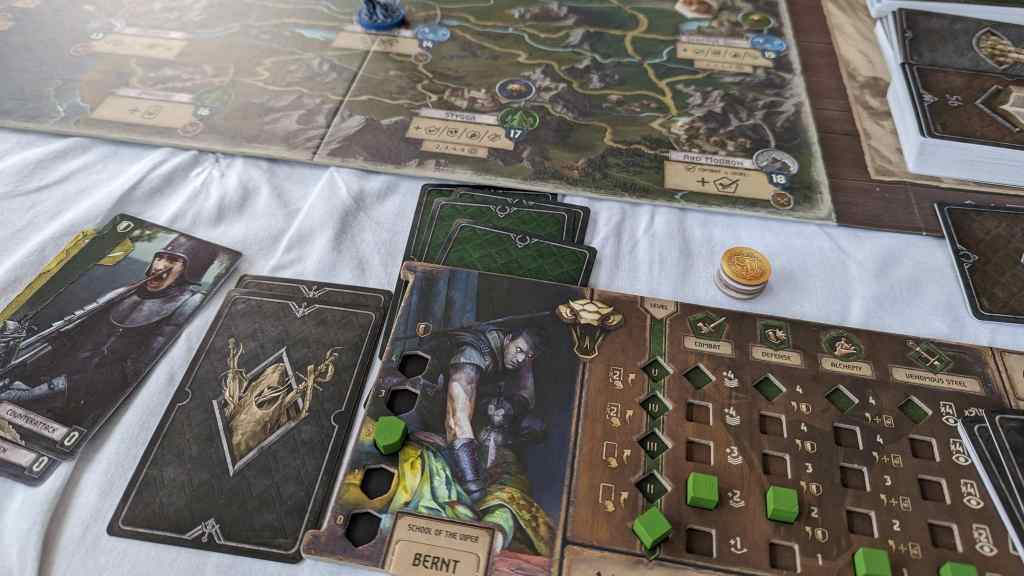
Worthy of tossing a coin
A combination deck builder and action RPG that has to support the weight of a huge property should in all rights be a complete mess, and I’m still genuinely astounded that The Witcher: Old World is anything but.
Issues with the rulebook prevent me from being able to go quite so far as to call the game’s design elegant, but the fact that a board game with this many components and systems can bring that word even vaguely into the conversation is an accomplishment on creator Go on Board’s part, and is flat-out remarkable. Its solo mode is a disappointment, but Old World managed to keep five people wildly entertained for a long afternoon that ended with all of us expressing interest in its expansions, which is a truly impressive feat.
Four stars: ★★★★
The Witcher: Old World
Designer: Łukasz Woźniak
Publisher: Go on Board
Release Date: June 2023
A copy of The Witcher: Old World was provided for the purposes of this review.
